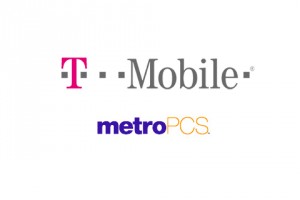 The parent company of T-Mobile USA has agreed to buy MetroPCS in a reverse stock split that leaves parent Deutsche Telekom able to eventually spin off the combined entity as an independent company and exit the U.S. market.
The parent company of T-Mobile USA has agreed to buy MetroPCS in a reverse stock split that leaves parent Deutsche Telekom able to eventually spin off the combined entity as an independent company and exit the U.S. market.
The merger will bolster T-Mobile’s mobile spectrum in several large cities, with up to 20MHz available for a robust LTE 4G network, better positioning the company to compete with third-place Sprint.
T-Mobile plans to decommission the smaller carrier’s CDMA network by 2015, gradually shifting MetroPCS users to T-Mobile’s HSPA+ and LTE networks as customers purchase new equipment. MetroPCS customers will find T-Mobile phones for sale immediately after the deal closes.
“We have no plans to smash together T-Mobile’s GSM and MetroPCS’ CDMA customers together,” said T-Mobile CEO John Legere, defending against any comparison with the Sprint-Nextel merger. “We will be encouraging customers to switch to T-Mobile’s network as customers upgrade their phones.”
Legere says any customers still using MetroPCS’ network during the last 8-12 months before the network is decommissioned will be offered a strong incentive, such as a deeply discounted phone, to move.

Legere
Legere adds the deal will cement T-Mobile’s position as America’s only nationwide carrier offering truly unlimited 4G HSPA+/LTE wireless data service. Sprint’s network still largely depends on 3G and an older, slower standard called WiMAX. Legere says T-Mobile will now become the nation’s largest no-contract phone carrier, and will emphasize it welcomes customers who bring their own phones to the carrier.
Legere adds T-Mobile’s new 4G network will be able to rival the quality of its larger competitors when it is fully deployed.
“The T-Mobile and MetroPCS brands are a great strategic fit – both operationally and culturally,” René Obermann, the chief executive of Deutsche Telekom, said in a statement. “The new company will be the value leader in wireless with the scale, spectrum and financial and other resources to expand its geographic coverage, broaden choice among all types of customers and continue to innovate.”
But the merger also may trigger an even larger wave of wireless consolidation in the industry, as remaining players jockey for position in response to today’s announcement. Both Sprint and Leap Wireless, which owns Cricket, are under increasing pressure from investors to respond. Leap Wireless could soon face a takeover bid itself, either from T-Mobile USA or Sprint. Some investors are even calling for Sprint and T-Mobile to merge, becoming a more effective competitor for Verizon and AT&T.
The proposed merger still needs approval from the Federal Communications Commission. Regulators are not likely to oppose deals with either MetroPCS or Leap Wireless, as both smaller carriers operate networks that largely do not overlap and both hold only a minuscule market share.
German investors wary about T-Mobile’s new emphasis on prepaid service, considered a negative in Europe, were reassured by Legere that Americans pay higher prices for prepaid, no contract service than what is prevalent in Europe.
The combined T-Mobile/MetroPCS remains the fourth place carrier with 42.5 million customers. Sprint has 56.4 million customers.
[flv width=”640″ height=”380″]http://www.phillipdampier.com/video/T-Mobile CEO Speaks About Combined Company with MetroPCS 10-3-12.flv[/flv]
T-Mobile CEO John Legere talks about the benefits of combining T-Mobile USA and MetroPCS. “This isn’t a deal to survive – it’s to thrive.” (5 minutes)


 Subscribe
Subscribe







